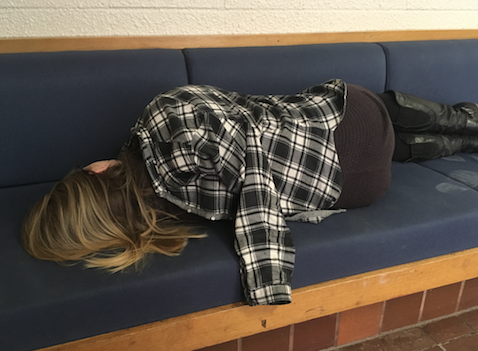
Loyalist College student napping between classes on the benches located outside of the bookstore on the first floor. Photo by Jessica Clement.
By Jessica Clement [1]
BELLEVILLE – An interesting contraption to battle restlessness on campus has been put on the backburner after its proposition at the student government meeting this month.
Student Life Executive Director Fred Pollitt brought the idea of sleep pods, or “nap pods” to student government leaders on Jan. 18.
“The idea was brought up just as a way for Fred to get an idea if our board thought it would be a success,” student government leader, C-Jay Stark said in an email response.
The addition was purposed originally by designers of the new third-floor development. Ultimately, Stark said the student government decided the idea would be set aside to prioritize improvements to student lounges and study areas throughout the college.
In 2016, Algonquin College received media attention from CBC and CTV after they purchased two EnergyPods from MetroNaps as a way to combat mental illness on campus.
Don MacRae, the administrative director for the Algonquin Student Association, said since their installation two years ago, the pods have been in constant use. However, each pod carried a hefty price tag of $10,000. The pods must also meet the Canadian Standards Association requirements. The pods light up and vibrate when a timer is done and they play music.
“Apparently the pods weren’t CSA standard for Canada,” due to an issue with the power supply, MacRae said. “So our beds are still currently being used, but they aren’t plugged in. Although, we haven’t had a single complaint about that from students.”
According to MacRae, many Algonquin College students commute to school and voiced their need for a space to rest during the sometimes two to three-hour gaps between classes. This same concern mirrors that of some Loyalist students, including electrical engineering student Alyshia Mowat.
“With two hours of wait time between classes and often early starts, I’m sure many people would prefer (nap pods). Especially because it gives you that cover and feeling of security that closing your eyes in the cafeteria or lounge just doesn’t have,” Mowat said.
Because of the high demand for these spaces, MacRae says Algonquin reps invested in six quality recliner chairs for napping purposes and are planning to create more rest stations in the future.
But there are some Loyalist students who say the money would be better spent on other resources.
“I would prefer that the effort and finances be put towards opening a daycare within the college. Sleep is awesome, don’t get me wrong, but I can’t use these things if I can’t access my program because of lack of childcare available,” said Loyalist student Lou Hall.
The National Sleep Foundation recommends short naps – ranging from 20 to 30 minutes – in order to improve alertness and performance without leaving the individual groggy, or restless at the end of the day. A NASA study tested on tired military pilots and astronauts found that 40-minute naps improved performance by 34 per cent and alertness by 100 per cent. According to a 2011 study published in the Journal of Sleep, lack of sleep costs American companies $63 billion in lost productivity each year, showing the implications extend beyond the individual.
However, until student government can finish their improvements on prioritized areas of the school, students will be stuck catching up on sleep in more outside-the-box spaces.